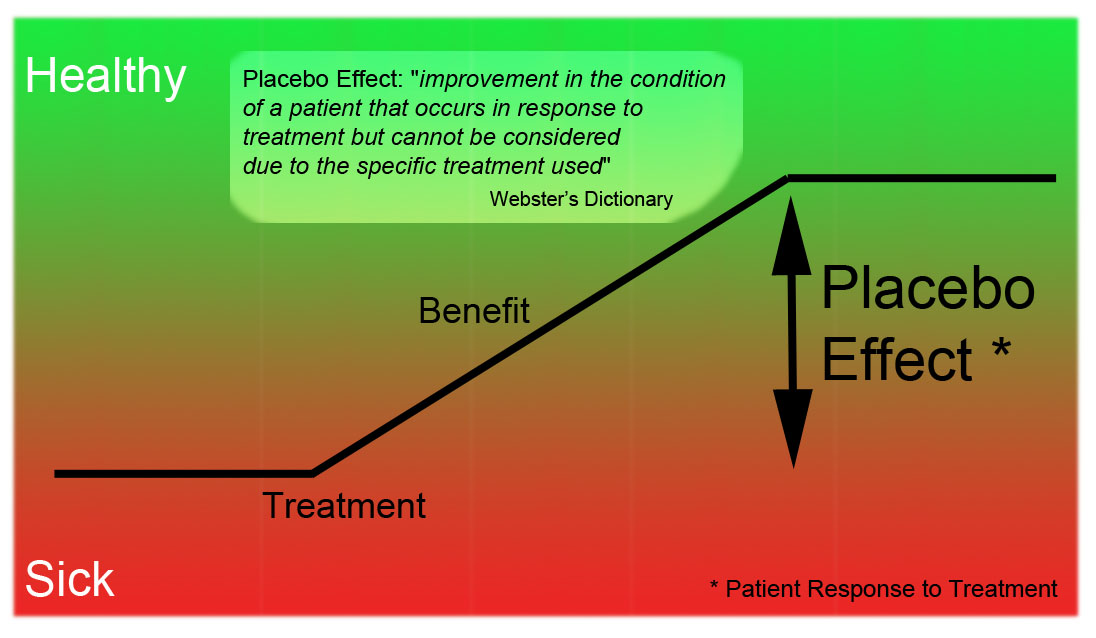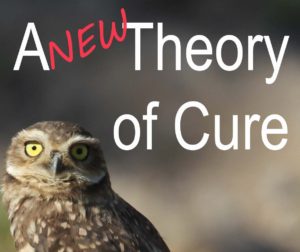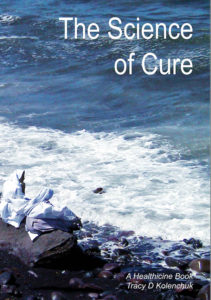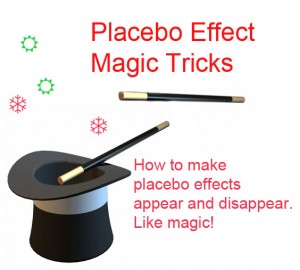 The placebo effect has mystified physicians, scientists, and patients for centuries. Placebo effects can appear and disappear, like magic.
The placebo effect has mystified physicians, scientists, and patients for centuries. Placebo effects can appear and disappear, like magic.
What is a placebo effect? Webster’s:
“improvement in the condition of a patient that occurs in response to treatment but cannot be considered due to the specific treatment used“
Are placebo effects magic? Or medicine? Or science?
The above diagram shows the definition of a placebo effect. Note: although the accepted term ‘placebo effect’ is commonly used – a more accurate term ‘placebo response’ has been suggested by many authorities as more accurate. The phrase ‘placebo response’ makes it clear that the patient’s response is being studied, not the specific treatment in isolation.
According to Webster’s dictionary:
1. Placebo effects are real, positive effects (nocebo effects are real negative effects).
2. Placebo effects occur “in response to treatment”.
3. Placebo effects cannot be caused by the treatment.
Therefore: Placebo effects are a logical paradox, a logical inconsistency.
A placebo effect is a real effect, in response to something that cannot cause the effect.
Can we make sense of this? Can we debunk the placebo effect? Yes, it’s trivial. “The treatment cannot cause the effect”, should say “We believe the treatment cannot cause the effect”.
When take the time to find the cause, the Placebo Effect disappears, like magic, as in this diagram:
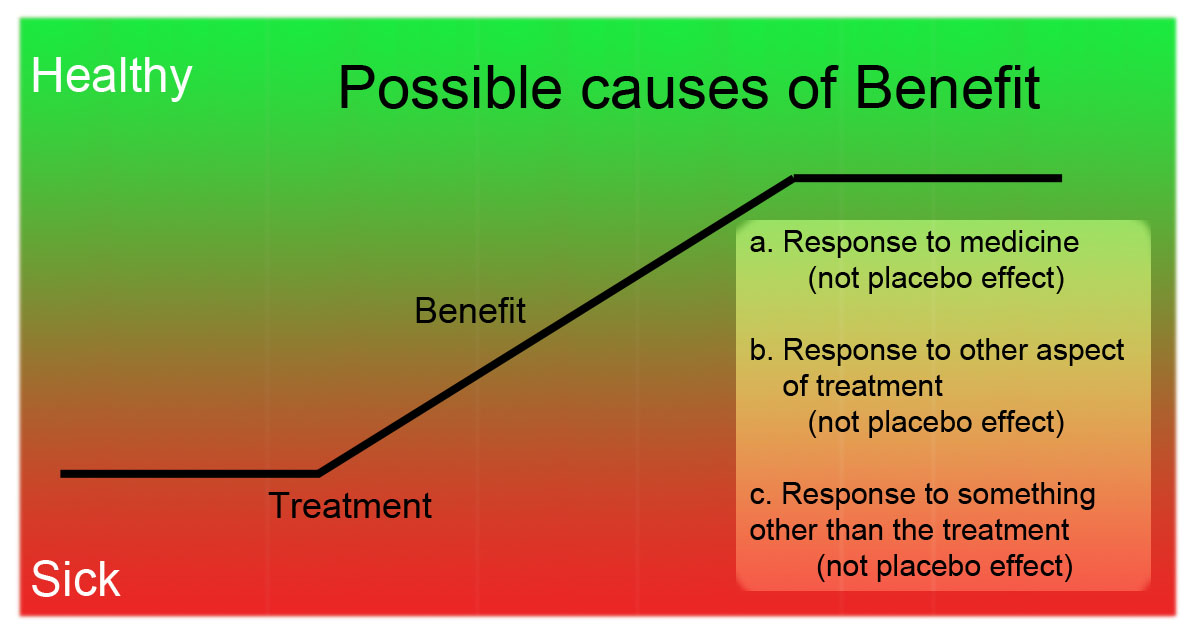 There are only three possible causes of the observed benefit
There are only three possible causes of the observed benefit
a. The patient responded to the medicine, therefore there was no placebo effect.
b. The patient responded to some other aspect of the treatment, not the medicine, therefore there was no placebo effect.
c. The patient responded to something else, something other than the treatment, therefore there is no placebo effect.
In all three cases, the Placebo Effect has disappeared, like magic. The paradox has disappeared.
A placebo effect can only exist when we observe an improvement in the condition of the patient, following a treatment, where we do not understand the cause of the improvement. Where we do not believe the improvement was linked to the treatment.
Something real caused the improvement. By definition:
– the treatment was real.
– the benefit is real.
– we don’t believe the treatment caused the benefit.
When we don’t believe the treatment caused the effect, we call it ‘placebo effect’. Placebo effect is defined by what we don’t know, by what we don’t believe.
Here’s a chart of Treatment A. After treatment A, the patient’s condition improved. The patient and the doctor might have different opinions about whether or not the benefit was provided by the treatment. When the doctor believes the treatment did NOT cause the benefit, he might call it ‘placebo effect’. What the patient believes is not considered relevant.
A treatment might consist of advice, or medicine, or physical treatment – even surgery, or a combination of many techniques. The word treatment includes all aspects of the treatment, not just the ‘medicine’. It includes the doctor’s presence and presentation, the doctor’s belief in the patient, and in himself, and in the treatment. It also encompasses the patients attitudes and beliefs. Most treatments take time to administer and to observe benefits. Understanding the effects of a treatment requires an understanding of the time that passed, of other things the patient might have done, or that might have happened during that time.
Each component of the treatment might make a small contribution, or a large contribution, to the patient’s response and the observed benefit. When we have complete understanding of all of the components, including the passage of time, we can see the cause of the improvement.
When we see the cause, there are no placebo effects. The medication either contributed to the benefit, or it didn’t. The doctor’s presence or lack of presence, contributed, or it didn’t. The actions taken by the patient, provided benefit, or did not provide benefit. There are no ‘placebo effects’, only real causes and real responses.
But, once a patient receives benefit, there is little incentive to investigate. Doctors are busy people, and need to move on to the next patient. The patient wants to get on with life. It’s easier to rationalize with “placebo effect” than to do a thorough investigation. In most cases, there is little to be gained from understanding.
It can be more complicated. Even when a doctor and patient agree that a treatment produces a benefit,, an external agent – another doctor, a medical association, or a research scientist, might disagree. This chart provides a summary of the possibilities when an external agent enters.
If the doctor and the external agency disagree, one might call the effect medical, while the other calls it a placebo effect. We now see clearly that a placebo effect is an opinion, where someone doesn’t understand the true situation. A different ‘other doctor’ might give a another opinion. Doctors are allowed to disagree, that’s why we look for second opinions.
Are all positive responses that we don’t understand “placebo effects”? Of course not. There are many medical treatments we don’t understand completely. Maybe we don’t understand any medical treatment completely. That doesn’t mean their results are placebo effects. The independent doctor might say “I don’t know.” Saying “I don’t know” is actually saying it’s NOT a placebo effect. It can only be a placebo effect if we claim to ‘know’ what didn’t cause the effect.
A medical response occurs when we believe we understand the cause. A placebo effect is when we believe we know what is NOT the cause. Calling it a placebo effect says nothing about the actual cause, it just says we “don’t believe” the benefit was caused by the treatment.
A placebo effect is not a fact, not a truth, it is simply an opinion, based on the absence of evidence. Once we understand the evidence, there is no placebo effect. Once we understand, it’s no longer a placebo effect. It becomes a real patient response, with a real cause.
For example:
A doctor is famous for using magic water to treat his patients. The water is magic because he says it’s magic.
But surprise. Many of his patients benefit from his magic water. Some experience more relief than they get from the most powerful painkillers. These are real benefits, observable by the patient, the doctor and by external reviewers. The magic water has no side effects, it’s just water, after all. But powerful medicines often have strong side effects.
It’s a ‘placebo effect’ when we limit our view to the water. The magic water is not a medicine. The benefits the patient receives are simply ‘placebo effects’, effects we do not understand.
When we expand our view to cover the entire situation, the patient, the doctor, all aspects of the illness and the treatment protocol – and we will find the actual source of benefit. When there is no mystery, no lack of knowledge there is no placebo effect. There is only the real effect. The water is a fake medicine, but it did not cause any effects, so there are no placebo effects to be explained.
Placebo effects are “positive responses that we do not understand”. Explaining them away by saying “placebo effect” only hides our lack of understanding. Claiming “fake medicine” does not add knowledge or value.
A medicine can only affect the physical body, but a treatment can affect more than the physical body. The painkiller medicine is designed to treat the body, and only the body. Like most medicines, it is based on the physical aspects of pain.
The Hierarchy of Healthicine recognizes that health goes beyond the body, and includes the mind, the spirits, and even the communities of the patient. A headache can be caused by mental stress, or by spiritual stress, or even by community stresses. Community stresses can cause spiritual stress, leading to mental stress, resulting in physical pain. This can result in pain, not just in the head, but also in the stomach, exacerbating an ulcer, or the fingers, exacerbating an arthritic condition. The magic water does not address any of these causes or causal links, but talking to a doctor, or a nurse in the waiting room, might address them, or begin to address them, leading to an improvement that is ‘not understood’. It cannot be understood by looking at the water. It cannot be understood by saying “placebo effect”.
We typically study the effects of painkillers in clinical studies. We find a group of people with pain, and test the effectiveness of the painkiller on their pain. If everyone’s pain is physical, based in the body – the painkiller will have a consistent effect. But painkillers do not have consistent effects. Some pains do not have physical causes, and painkillers are less effective on these patients.
When we study every person who receives positive results from the ‘magic water’, we learn many different reasons why magic water treatment (not magic water) can be effective. The treatment might support the patient’s spirit, lifting their mental status, and helping them to cope. They report less pain. The response is real. The treatment is real. The treatment produces the benefit.
If the patient’s headache is caused by drinking too much last night, the patient has a hangover – and is suffering from dehydration. The cure? water, magic or not. The magic water can actually cure some headaches.
When we look at a painkiller treatment, we can clearly see that some patients, those whose pain is not in the body, cannot benefit from the painkiller. But, they might benefit from talking to the doctor, or talking to the nurse, or even due to the passage of time from initial diagnosis and prescription to improvement. The painkiller might dull the pain in a person with a hangover, but it does not actually cure the dehydration. It does not provide any information to the patient on how to avoid those headaches in the future.
Once we understand, there is no placebo effect. A placebo effect is by definition, something we do not understand. The magic water is a “not medicine”. It did not cause the ‘placebo effect’, because there are no placebo effects. The magic water treatment is not a placebo. It is a real treatment, powerfully effective for some patients.
Does this mean placebo effects do not exist? Yes, and no. Placebo effects exist until we understand them. Then they cease to exist.
Is the magic water treatment unethical? Should the doctor who gives the magic water treatment STOP giving this treatment, because it is a placebo treatment? Nope. Once we understand, it is no longer a placebo effect. It is a real effect, that can be used to improve the condition of the patient.
“But,” says the critic, “how can we address the problem of hucksters, quacks, who sell magic water, even though it provides no benefit?” There are many hucksters. The person who claims ‘placebo effect’ is clearly a huckster – speaking strongly about what is not understood. We might ask the question: how can we address the problem of good, honest doctors, who prescribe a painkiller when it cannot provide the benefit needed, when a different, more mental, spirit, or social treatment is required, when magic water treatment will work better, provide more benefit? We need to pay for medical treatments that work, not just for those we ‘believe in’.
If medical science can find more effective treatments, more power to them. But as long as medical science continues to ignore the mind, the spirit and the community aspects of healthiness and of illness, “magic water treatments” will continue to produce better results than ‘medicines’ for some illnesses.
What about placebos? If placebo effects disappear when we understand, do placebos exist? Can we make them disappear too? Well, placebos are complicated. We’ll need another post to cover placebos, now that we understand placebo effects.
to your health, tracy
Tracy is the author of two books about healthicine:

